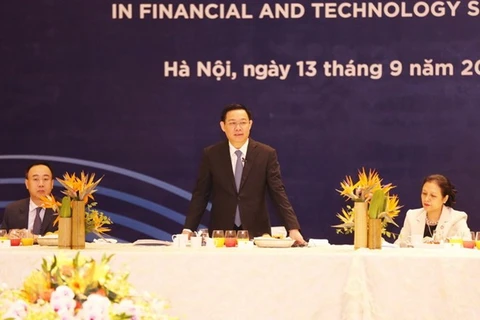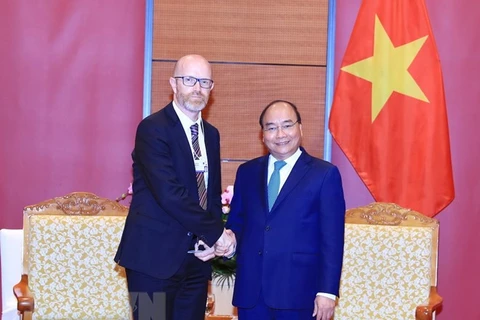 At the seminar discussing the opportunities, challenges and current trends of the healthcare system in ASEAN (Photo: VNA)
At the seminar discussing the opportunities, challenges and current trends of the healthcare system in ASEAN (Photo: VNA) Hanoi (VNA) – A seminar discussing the opportunities, challenges and current trends of the healthcare system in ASEAN took place in Hanoi on September 13 as part of the World Economic Forum on ASEAN (WEF ASEAN) 2018.
David Sin, Founder and Deputy Chairman of Fullerton Healthcare Corporation Limited (Singapore), said that in the next 10 years, total spending on healthcare in the Asia-Pacific will account for 45 percent of the global figure, with the growth rate of health costs standing at 8 percent.
Over the period, the region is estimated to have 460 million people over 65 years old, 65 million people with obesity problems, and 275 million people over 18 years old with complications related to weight.
Asia is also said to have the fastest ageing rate compared to other global regions.
It is possible for ASEAN to make some breakthroughs in healthcare system with the development of science and technology in collaboration with economics, he said.
Meanwhile, Senior Strategy Advisor of Policy and Philanthropic Partnerships for the Bill and Melinda Gates Foundation Asia, Hari Menon, said that ASEAN needs to devise financial plans in order to support poor citizens’ access to healthcare. As countries must work together to improve the healthcare system, the public and private sectors should also do the same to find significant partners.
President of Novartis Mexico Alexis Serlin said although the region is facing many difficulties, new discoveries brought about by technology and pharmaceutical products have offered opportunities to the healthcare system. Notably, the establishment of an electronic health database will contribute to the interventions, raising the efficiency of treatment.
Chief Executive Officer for Philips ASEAN Pacific Caroline Clarke said that home healthcare has surged in ASEAN and around the world. Meanwhile, new technology needs to be applied in the healthcare system, such as cloud computing and artificial intelligence.
Health Minister Nguyen Thi Kim Tien said that Vietnam and other ASEAN nations have faced the burdens of infectious and newly-discovered diseases, as well as non-communicable ones.
While quality in hospitals has been enhanced, Vietnam’s early screening system is yet to be completed and needs improvements in the time to come.
The country’s health sector is working to bring fundamental healthcare programmes to more than 13,000 remote and mountainous villages nationwide, she noted.
The sector is calling for private firms to invest in Vietnam’s healthcare system, as well as seeking sources from State budget, bond capital mobilisation, and official development assistance.
Education to raise public awareness about health knowledge will improve the livelihoods and productivity of Vietnamese workers, thus making greater contributions to the national economy at all levels, Tien said.
She also revealed that Vietnam’s health sector will set up a programme consisting of three systems – namely smart hospitals, smart patient access, and smart health management, adding the Ministry of Health will cooperate with relevant agencies to accelerate the programme in the time ahead.-VNA
VNA
























